
Johnny Young is a Dutch Australian singer, composer, record producer, disc jockey, television producer and host. Originally from Rotterdam, The Netherlands, his family settled in Perth in the early 1950s. Young was a 1960s pop singer and had a number-one hit with the double-A-sided, "Step Back" and a cover of the Strangeloves' "Cara-lyn" in 1966. Young's profile was enhanced by a concurrent stint as host of TV pop music program The Go!! Show. Also in the mid-1960s, Young toured with the Rolling Stones and supported Roy Orbison.

John Peter Farnham AO is a British-born Australian singer. Farnham was a teen pop idol from 1967 until 1979, billed then as Johnny Farnham, but has since forged a career as an adult contemporary singer. His career has mostly been as a solo artist, although he replaced Glenn Shorrock as lead singer of Little River Band from 1982 to 1985.
Spectrum are an Australian progressive rock band which formed in April 1969 and broke up in April 1973. The original line-up was Mark Kennedy on drums, Lee Neale on organ (ex-Nineteen87), Bill Putt on bass guitar, and Mike Rudd on guitar and lead vocals. In August 1970 Kennedy was replaced by Ray Arnott on drums. These members also performed under the alter ego, Indelible Murtceps, from 1971 to 1973. Spectrum had a number-one hit, "I'll Be Gone", on the Go-Set National Top 60 singles chart. After Spectrum and Indelible Murtceps disbanded, Putt and Rudd formed Ariel. In 1999 the pair formed Spectrum Plays the Blues, which later trimmed their name back to Spectrum. On 7 August 2013 Bill Putt died, after a heart attack.
Go-Set was the first Australian pop music newspaper, published weekly from 2 February 1966 to 24 August 1974, and was founded in Melbourne by Phillip Frazer, Peter Raphael and Tony Schauble. Widely described as a pop music "bible", it became an influential publication, introduced the first national pop record charts and featured many notable contributors including fashion designer Prue Acton, journalist Lily Brett, rock writer / band manager Vince Lovegrove, music commentator Ian Meldrum, rock writer / music historian Ed Nimmervoll and radio DJ Stan Rofe. It spawned the original Australian edition of Rolling Stone magazine in late 1972.
Colleen Hewett is an Australian theatre and TV actress, and a popular singer and recording artist
Edward Charles Nimmervoll was an Australian music journalist, author and historian. He worked on rock and pop magazines Go-Set (1966–1974) and Juke Magazine (1975–92) both as a journalist and as an editor. From 2000, Nimmervoll was editor of HowlSpace, a website detailing Australian rock/pop music history, providing artist profiles, news and video interviews. He was an author of books on the same subject and co-authored books with musicians including Brian Cadd and Renée Geyer.
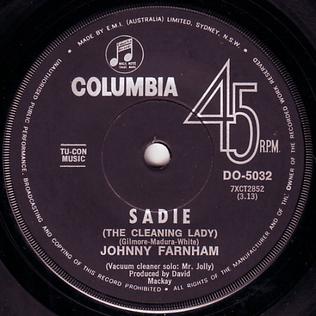
"Sadie " was Australian pop singer Johnny Farnham's first solo single. The novelty song was released in November 1967 and was No. 1 on the Go-Set National Singles Charts for five weeks in early 1968. It was the largest selling single in Australia by an Australian artist in the 1960s. The single, "Sadie" sold approximately 183,000 copies in Australia and was the highest selling Australian single until "Up There Cazaly" was released in 1979. and was also released in New Zealand, Denmark and Germany. The B-side, "In My Room" was written by Farnham. The A-side's label includes the acknowledgement "Vacuum cleaner solo: Mr. Jolly".

John Farnham, billed under stage name Johnny Farnham from 1964 until 1979, is a British-born Australian pop singer who has released 21 studio albums, three extended plays, 19 compilation albums, six live albums, 17 video albums, 74 singles, 25 music videos and 12 soundtracks.
Gregory John Macainsh is an Australian former musician and songwriter. He provided bass guitar and backing vocals for pop rockers, Skyhooks from 1973 to 1980 and subsequently for various reformations. According to Australian musicologist, Ian McFarlane, "Macainsh's biting, provocative songs were the perfect expression of adolescent obsessions and frustrations. With those songs, the band made an enormous impact on Australian social life." Macainsh became an intellectual property lawyer.

Uncovered is a solo studio album by British-born Australian singer John Farnham, produced by Little River Band's Graeham Goble, and released on 3 July 1980, which peaked at No. 20 on the Australian Kent Music Report album chart and was certified gold in 1981.
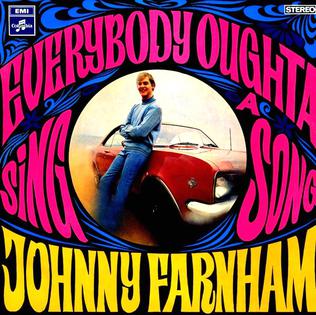
Everybody Oughta Sing A Song is the second solo studio album by Australian pop singer John Farnham and was released on EMI Records in November 1968. Its first single, released in July, was the double A-sided, "Jamie"/"I Don't Want To Love You", which peaked at No. 8 on the Go-Set National Singles Charts. The second single, "Rose Coloured Glasses" was released in October and peaked at No. 16. Writers on the album included Hans Poulsen, Neil Diamond and Quincy Jones. The album was re-released in 1974 with a different cover, it shows Farnham performing live on stage, whereas the initial 1968 release had him leaning against a Holden Monaro.
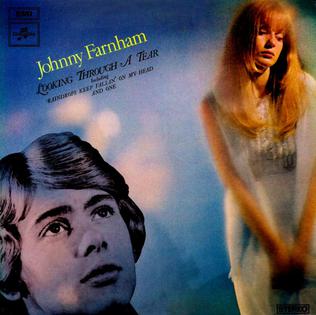
Looking Through A Tear is the third studio album by Australian pop singer Johnny Farnham, the title of which relates to a song on the album, which is a cover of an Aretha Franklin number. it was released in Australia by EMI Records in July 1970. Farnham's covers of Harry Nilsson's penned "One" which became a hit for Three Dog Night and a cover B. J. Thomas' single "Raindrops Keep Fallin' on My Head" were released as singles, and helped to propel the album to No. 11 on the Australian Kent Music Report Album Charts. "One"/"Mr. Whippy" was released as a double A-side in July 1969 and peaked at No. 4 on the Go-Set National Singles Charts. "Raindrops Keep Fallin' On My Head" was released in November and peaked at No. 1 for seven weeks in January–March 1970. Farnham wrote two songs for the album.

Christmas Is... Johnny Farnham is a studio album of Christmas songs recorded by Australian pop singer John Farnham and released on EMI Records in December 1970. The single, "Christmas Happy", was also released in December. It would be Farnham's only Christmas album until some 46 years later, when in 2016 he would release Friends for Christmas, a duet seasonal album with Olivia Newton-John.

Johnny is the fifth studio album by Australian pop singer John Farnham, which was released on HMV for EMI Records in August 1971. It peaked at No. 24 on the Australian Kent Music Report Albums Charts. Farnham had earlier No. 1 singles with "Sadie " in 1968 and his cover of "Raindrops Keep Fallin' on My Head" in 1970; a non-album single, "Acapulco Sun" was released in May 1971 but there were no charting singles from Johnny. The album features compositions from artists as diverse as George Harrison, Elton John, Stevie Wonder, Joe South and George Gershwin and Ira Gershwin
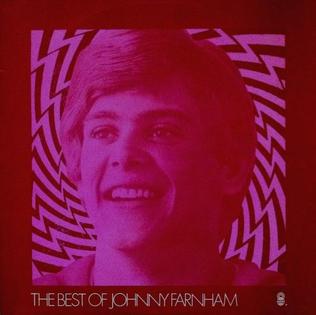
The Best Of Johnny Farnham is the first compilation album by Australian singer Johnny Farnham, it was released on World Record Club in 1971. "Sadie " was first released in November 1967 and peaked at No. 1 on the Go-Set National Singles Charts for five weeks early in 1968. His cover of the B. J. Thomas hit "Raindrops Keep Fallin' on My Head" had been released in November 1969 and peaked at No. 1 for seven weeks in January–March 1970. The album cover was available in a variety of colours including orange, red and blue.
The Masters Apprentices were an Australian rock band fronted by Jim Keays on lead vocals, which originally formed as The Mustangs in 1964 in Adelaide, South Australia, relocated to Melbourne, Victoria in February 1967 and attempted to break into the United Kingdom market from 1970 before disbanding in 1972. Their popular Australian singles are "Undecided", "Living in a Child's Dream", "5:10 Man", "Think About Tomorrow Today", "Turn Up Your Radio" and "Because I Love You". The band launched the career of bass guitarist Glenn Wheatley, who later became a music industry entrepreneur and an artist talent manager for both Little River Band and John Farnham.
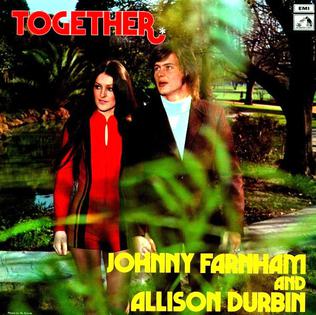
Together is a studio album of duets by Australian pop singers John Farnham and Allison Durbin, which was released on HMV for EMI Records in September 1971. It peaked at No. 20 on the Australian Go-Set's Albums Chart.

Johnny Farnham's Greatest Hits is a compilation album by Australian pop singer John Farnham. The album was released in July 1976. It was Farnham's last album for EMI.
"Living in a Child's Dream" is a song by Australian rock group, the Masters Apprentices. It was released in August 1967 on Astor Records as the lead single from the band's second EP The Masters Apprentices Vol. 2. The track was written by the group's guitarist, Mick Bower. It peaked at No. 9 on the Go-Set national singles charts.
Darryl Lloyd Sambell was an Australian accountant, talent manager and music promoter from the mid-1960s.












